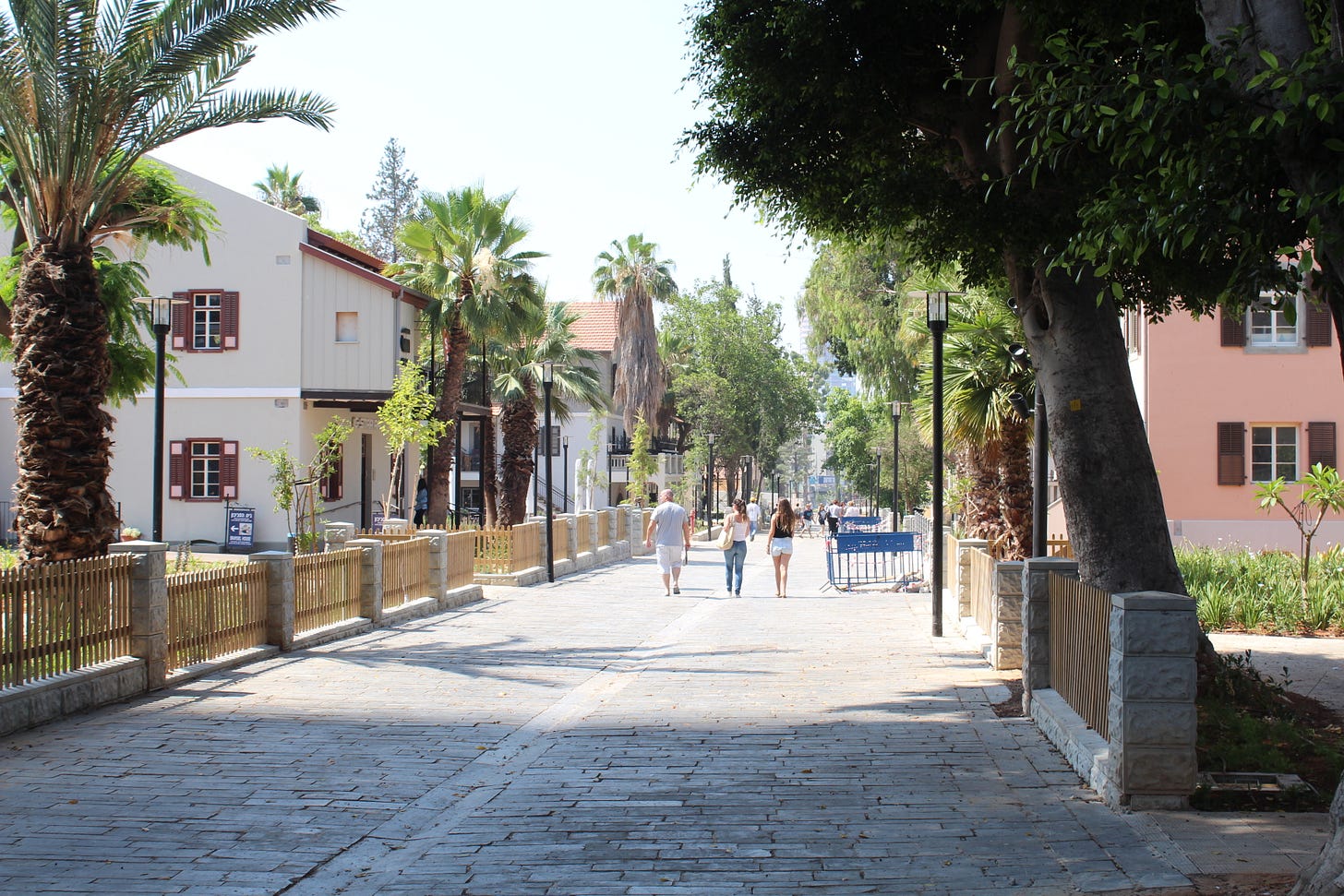Tel Aviv Diary September 16, 2022
Final Election List Submitted,IDF Officer Killed, Two Years to Abraham Accords, Funding to Many Start-Ups, Inflations Eases and a Restaurant Review
POLITICS
Prime Minister Netanyahu has been working overtime to ensure votes for his block are not wasted. Last week he engineered a merger between Ben Gvir’s Otzma Yehudit (Jewish Power) Party with Smotritch’s Religious Zionist Party — the cost of which is the further mainstreaming of Ben Gvir’s ultra-right-wing extremist worldview in the Israeli political system.
This week, Netanyahu put intense effort into uniting the two flanks of the United Torah Party. The problem is that the Belz Chasidim have decided they want their students to receive basic secular education, and seek to receive additional government funds in return. The Lithuanian Yeshivot are against introducing secular education into their curriculum, regardless of the potential benefit. To make the merger happen Netanyahu pledged that even Yeshivot that refuse to teach basic secular studies to their students would receive enhanced funding— a promise which is a disaster for the country.
With Haredim becoming an ever larger percentage of the population, if they do not receive a basic education, they will be unprepared to participate in the economy of the 21st century. Netanyahu’s latest vow is particularly sad, as, for the first time, there is willingness amongst part of the Haredi community to give their students a basic secular education. However, as is his modus operandi, Netanyahu prioritized his own political needs before the needs of the country. The direct cost of this campaign promise is estimated to be NIS 4 billion; while the indirect costs of keeping the Haredi community from obtaining a secular education are estimated at as much as NIS 50 billion a year.
Not content with merely reuniting the ultra-Orthodox Netanyahu met with Rabbi Taub, spiritual leader of the far right anti-LGBT Noam party. It’s not clear what Netanuahu promised Noam, but after the meeting the party said it would also run together with the Religious Zionism, led by MK Bezalel Smotrich.
Meanwhile, the Zionist Spirit Party crumbled this week, when Tzvi Hauser and Yoaz Handel split from Ayelet Shaked. The basic reason was that Shaked made clear she was willing to enter into a coalition with former Prime Minister Netanyahu, something Hauser and Hendel are resolutely not willing to do. Within a few days Shaked found a new home as head of the Jewish Home Party. What is left of the Yamina Party will merge with the HaBayit HaYehudi (Jewish Home) Party. The general sense is that HaBayit HaYehudi will not pass the electoral threshold. Hendel and Hauser announced they will sit out this election cycle. A disappointing repercussion of the pair’s break from the Knesset is that Hendel was one of the most effective Knesset Ministers.
The Likud finalized its list on Wednesday night, when Netanyahu submitted the names of the people he chose to fill as his reserved appointments on the list. The first two nominees were former Yamina MKs Amichai Chikli and Idit Silman; both of whom were key in bringing down the last government. The other appointment was Moshe Sa’ada, former deputy head of the police investigations unit, who had been fired from his job. Sa’ada recently gave an interview critical of police and the Justice Ministry for charging Netanyahu. The interview made Sa’ada an instant hero in the Likud.
When she brought down the current government, Silman claimed she had received no promises from the Likud. It should also be noted that Aryeh Deri who resigned from the Knesset a few months ago (as part of a criminal plea deal), is now running as the head of the Shas list.
Last night the parties were required to submit their lists to the Knesset. In a major last minute surprise the Arab Joint list splintered before the final lists were submitted to the Knesset. The decision by Balad not to run together with the Joint List could result in none of the Arab parties achieving enough votes to get into the Knesset, and thus ensure Netanyahu’s bloc wins. Netanyahu united his bloc and is unlikely to have any wasted votes. His opponents on the other hand, have 4 parties in danger of not reaching the electoral threshold.
DIPLOMACY
Prime Minister Lapid and met with visiting UAE Foreign Minister Sheikh Abdullah bin Zayed Al Nahyan. The foreign minister also visited Yad Vashem and attended a reception by the UAE Ambassador celebrating two years since the Abraham Accords.
DEFENSE
Maj. Bar Falah, 30, the deputy commander of the Nahal commando unit died on Wednesday morning near the security border with the West Bank. Falah was killed trying to apprehend two Palestinians who had approached an army outpost earlier that day. The overall security situation on the West Bank seems to be getting worse, and the Palestinian Authority is less willing or able to take action against militants.
Reports this week confirm that Germany has decided to buy the Arrow missile defense system from Israel, making it a cornerstone of Europ’s missile defense system.
On Wednesday night, President Herzog held a reception for over two dozen Army
Chiefs of staff from around the world, who participated in the first International Operational Innovation Conference. Among those in attendance were the US Chief of Staff General Miley, and the Chief of Staff of the Moroccan Army. There has been criticism of the IDF, by some, for spending money on such a conference, which will cost upwards of NIS 20 million. However the return on investment will be huge, both in terms of cooperation with foreign militaries and the indirect impact on arms sales.
ECONOMY
The price index in Israel went down by .3% in August, easing fears of inflation. However, housing prices did not go down, registering a 17.9% increase year over year.
According to a report published by the Henley Global Citizens Tel Aviv has 42,400 millionaires. 2,260 of them are worth more than $10 million, 118 are worth more than $100 million and 12 of them are billionaires. To be included in the list you must have investable assets of more than $1million, thus the value of apartment owned and lived-in is not included.
The raising of the interest rates seems to have had an impact on the housing market with new home/apartment sales down 20% from last year. Sales are down, but prices so far have not dropped.
BUSINESS
Elbit Systems Ltd. was awarded a contract valued at approximately $76 million to supply an Electronic Warfare (EW) training capability to the Air Force of a country in Asia-Pacific. The contract will be performed over a period of two years.
Zinga has acquired Storemaven. The price of the acquisition has not been announced, but it is estimated to be in the tens of millions of dollars.
Bright Data is acquiring Market Beyond for several million dollars.
Zesty which develops software to optimize cloud computing has raised $75 million. This brings the sum the company has raised since its founding in 2019 to $116 million.
Sightful, maker of software that analyzes cloud transactions has raised $18 million. This brings to $24 million the total raised by the company to date.
Opus Security exited stealth mode and announced it had raised a seed round of $10 million. The company is developing a platform to automate the cyber security response on a cloud asset.
Joonko Diversity has raised $25 million to finance its expansion, the company makes an HR platform that maximizes the utilization of personnel in a company.
Dig Security raised $34 million in an A-round of funding. The company is developing a security product to protect cloud-based information. The round was led by SignalFire.
A PIECE OF HISTORY - SARONA
Sarona was first settled by Templers in 1871. The Templers were German Christians, who purchased 60 hectares of land from a Greek monastery north of Jaffa. In October 1871, the foundation stones were laid for their first houses. Sarona was a difficult area to live in and 28 of the 125 Sarona settlers died in 1872.
By 1889, 269 people lived in Sarona. There were 41 homes, a communal hall, a winery, workshops, barns and sheds. Templers brought modern farm techniques to Palestine. During World War I, the Templers were interned after the British conquered Palestine. Most returned after the war. During World War II, all of the Templers were interned, and eventually expelled. After the war, the land of Sarona was determined to be “enemy land” and was handed over to the government. The area was first taken over by the Tel Aviv municipality, but soon became part of the IDF headquarters, known as the “Kiriya”.
For many years, Sarona was used by support units of the Kiriya. Once urban renewal took place in the area, it was decided to preserve a number of the original buildings. In 2008, a major renewal program was begun to turn the area of Sarona into an entertainment complex. Today, Sarona is home to restaurants, several high-end shops, as well as headquarters for a number of Israeli startups. A central building contains a large indoor food market
.
A TASTE OF TEL AVIV — by Tali Schulman
Today we talk pizza. In a city that in my opinion (as a humble New Yorker), did not understand pizza until quite recently, I can honestly say Tel Aviv has upped its pizza game in the past few years. With all of these fairly new pizza shops (and bars), I have to single out one particularly delicious establishment, my personal favorite — Lila Pizza. Located on a small side street right out of Shuk Levinsky, Lila uses the best ingredients to make the perfect thin crust pizza with consistently unique toppings. I don’t think I could pick one all-time favorite, to be honest, but I’ll always lean toward anything with caramelized onions, and you cannot go wrong with their corn pizza (not to be unfairly compared with its cousin, the Israeli “corn from a can” pizza which doesn’t even remotely compare). Order on Wolt if you’re looking to stay in, or venture out to Levinsky and enjoy your pizza with a bottle of wine. Either way, you can’t go wrong.
.
For more restaurant recommendations, find me on Instagram @talischulman all my food adventures are saved in my highlights!









